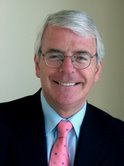Below is the text of the speech made by John Major, the then Prime Minister, at the Cafe Royal in London on the 12 December 1990.
Ladies and Gentlemen:
Chairman, thank you very much indeed. I must let you into a secret that not many people are aware of –
Jack was kind enough to say that minutes were precious and to thank me for coming. If I may say so, I think perhaps I should thank him for inviting me because the reason I was keen to come today is because there are many of us here who are very fortunate in that we have to face no disability in the normal journey through life that all of us have; but those who do need a very special courage to face that –
Faced with a disability, whether it be deafness or perhaps some other disability or perhaps a myriad series of disabilities which alas is so often the case, it does take a very remarkable kind of personal courage to enter into that commitment into society and the young people that I had the privilege of meeting just before lunch today were people who have not only had the courage to enter into society in that particular fashion but have achieved very remarkable things as a result of having done so and for me, it is a very great privilege today to have had the opportunity of meeting them. A privilege but not a surprise, for having been Minister for the Disabled, albeit for the all too short time of just a year, I learned during that period across a whole range of disability, with what enormous courage so many people in this country face hurdles that many of us cannot imagine and perhaps would not be able to cope with if we were able to imagine them. For we ought not to pretend, as we see these young people receiving their well-
Many of us might think what today’s finalists have done was almost impossible but I think if you do think that, that shows the failure of our imagination and not theirs, for the young people who receive these awards did realise what could be done, put themselves to do it and have succeeded in my judgement in rather spectacular fashion.
One of the reasons I regard this as an important occasion is to touch upon something that Iain Vallance said. In many ways, these young people offer a very considerable beacon of hope to other people who are disabled as to what they can achieve in their own lives and they have precisely the same right to achieve what they can in their lives that everybody else has and we have an obligation to assist them to do it, whether or not they be disabled, and to ensure that they can get the maximum possible out of their lives provided that they will put into it –
I hope that those people who perhaps still have in their minds some form of prejudice or difficulty because somebody has one form of disability will realise that one form of disability does not disable people from the normal functions of life, the normal responsibilities of life, the normal duties of life and the normal pleasures that the rest of us are able to enjoy.
If there is one thing that has been happening remarkably in the last twenty years or so, but which still has further in my judgement to go, it is to open up the opportunities for people who are disabled that those who are not disabled have over the years come to take for granted and I hope that that is something we will all be able to take a part in doing in the years ahead.
The people who are disabled know from their own experience the will power that is necessary to achieve what they have achieved and I think in terms of will power and courage, if there are two attributes that the young people you will meet shortly have demonstrated to a very remarkable extent it is those. I hope that we will continue to encourage them and many others to achieve precisely the same things in the future.
I would, if I may, therefore like to thank most warmly both [indistinct] and Iain Vallance and British Telecom for sponsoring this event, for the enormous amount that they have done, are doing and I very much hope will continue to do in the future and perhaps I should also mention just as an example, the contribution that British Telecom has made to the Royal National Institute for the Deaf telephone exchange for the deaf, which it has been jointly funding with the Government. This does allow deaf people to telephone, hearing people by providing an operator with whom deaf people can communicate through text; the operator then passes on their message. British Telecom announced a grant of 4 million pounds this year to allow this service to continue and I would like publicly to express my thanks to Iain Vallance for that very generous and … [Applause].
I think, if I may presume to speak upon behalf of the award winners today and perhaps also a little wider on behalf of disabled people –
I think, if I may say so, Chairman, that the principal purpose of today’s meeting is to honour those young people who have won in a very in a very remarkable fashion these awards which are so difficult to obtain and so I will say no more except to say that in a few moments I hope you will give a very warm welcome indeed to a number of very remarkable young people who have achieved what few could have achieved and which all of us may look at with a certain degree of pride that young people in our country can do such things despite the handicaps that they face.[Applause].
